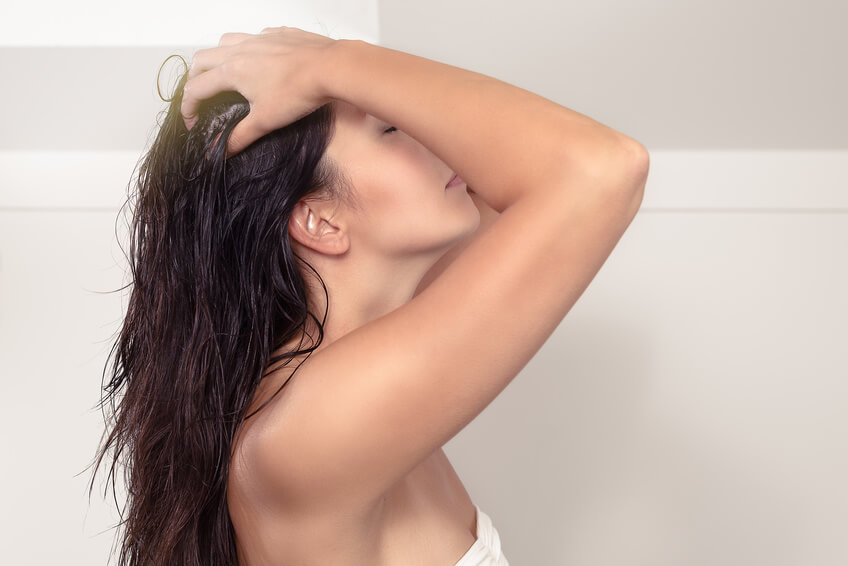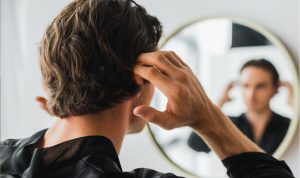According to a study by the market research institute Ipsos, every second woman in Germany suffers from an irritated scalp. Anyone who is familiar with this feeling of itching or tightness on the head knows how unpleasant it can be.
As our scalp is usually covered by hair, it often doesn’t get the attention it needs. Until it’s too late! Seasonal irritation in particular is not uncommon: Autumn time and irritated tapping skin – what to do? We answer this question here.
Our scalp and its problem areas
“The scalp is one of the most sensitive regions of our body. If the processes taking place in the scalp are disturbed, local complaints such as dry skin, dandruff or itching can occur. The hair also often suffers, as the health of the scalp affects the appearance of the hair,” writes gesundheit.de. Even healthy scalps can become stressed and irritated as a result of intensive hair treatments, such as bleaching, coloring or hair straightening.
Not only pollutants, but also sunlight or blow-drying too hot can cause irritation on the scalp. It usually starts with a loss of moisture, which can permanently disrupt the natural skin barrier. Itching, redness or irritated areas are then often the result, not only directly on the scalp, but also on the neck or around the ears. Another manifestation can be visible flakes of skin that peel off.
In some cases, however, mites or lice can also be the cause of irritation. If you are unsure, you should therefore always consult an expert to get the right treatment.
Healthy scalp – healthy hair
A healthy scalp with good circulation is the best prerequisite for beautiful hair. Moisture is particularly lacking when the scalp is exposed to cold and heated air. If the balance of the scalp is lost, gentle cleansing should be used so that the balance can be restored. Soothing moisturizing shampoos that do not cause additional stress are ideal. But be careful with the ingredients: natural active ingredients should be used, e.g. panthenol and chamomile extract have a calming effect. A betaine complex provides dry scalps with moisture. Willow bark extracts, for example, enable the gentle removal of excess dandruff.
Above all, silicones, parabens, sulphates, colorants and fragrances should be avoided. But surfactants can also be avoided. It is mainly the foam that is a burden and does not necessarily have a positive effect on cleansing. Unfortunately, this idea is firmly anchored in many people’s minds, which encourages irritation of the scalp and consequently the hair. Rather, it is the gentle cleansing ingredients, such as those in skinicer Sedative Shampoo, that should be preferred.
And of course, scratching is absolutely forbidden. Anything that irritates the scalp should be avoided, e.g. metal brushes with sharp bristles, excessively hot water or blow-drying and too frequent washing. The use of straighteners and curling irons should be kept to a minimum so that the scalp can calm down and regain moisture and resistance.
Further facts and interesting tips can be found in the following video with our expert and leading dermatologist:
Neurodermatitis or seborrheic eczema
In addition to daily influences, allergic reactions can also be possible causes of itching, redness or even diseases such as neurodermatitis or seborrheic eczema. This should always be checked by a doctor. This is because there are many reasons why seborrhoeic eczema can develop:
- In addition to a genetic predisposition or
- a weakened immune system
- It is suspected that a fungal infection can promote the outbreak.
This is usually accompanied by redness and/or dandruff. Scratching the scalp can also allow germs such as bacteria and fungi to penetrate into deeper layers of the skin and cause inflammation. These in turn intensify the itching and often cause a permanent problem. However, by choosing skin-soothing and germ-inhibiting care products, this problem can also be brought under control.
Did our article: Autumn time and irritated scalp, help? You can also read more tips on skin and scalp in our expert tips. If you have any questions, you can also send an email directly to our experts: info@ocean-pharma.de
Image source: Fotolia




